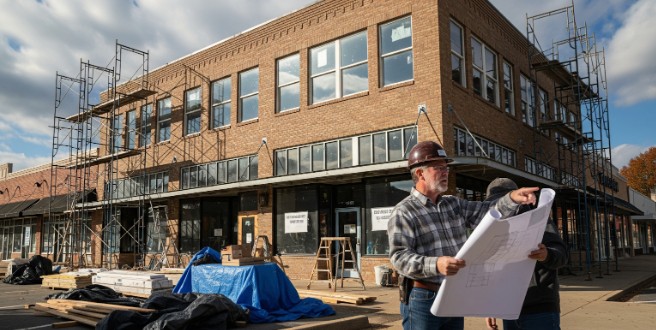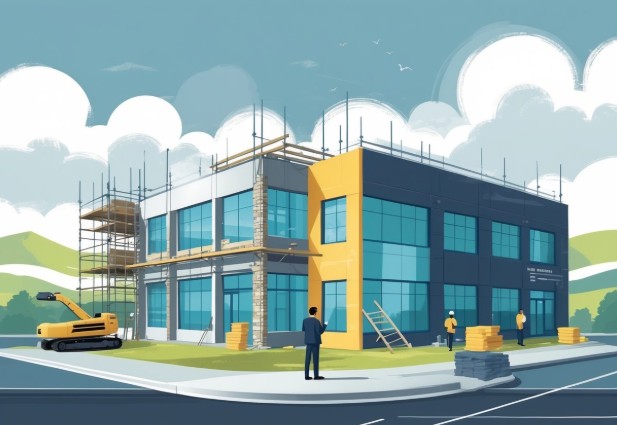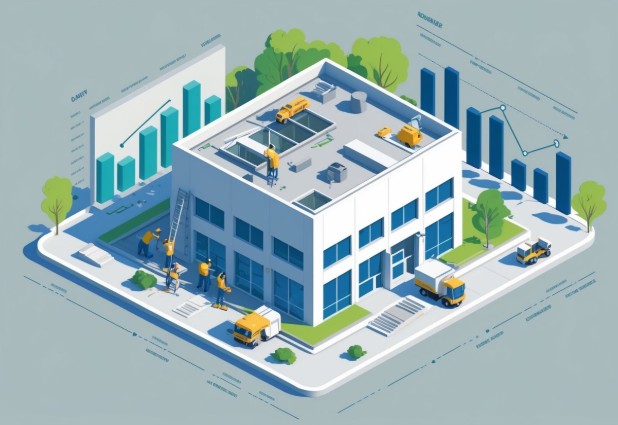Call Today! 256-270-9466
Call Today! 256-270-9466
Originally published: August 2025

Property owners in North Alabama face a tough choice when considering commercial renovations: which upgrades will actually deliver the best return on investment?
The region’s commercial real estate market, particularly in Huntsville and Madison County, continues to grow, offering unique opportunities for value-driven upgrades that can significantly enhance property value.
The average renovation cost per square foot for commercial office space falls around $200.
But smart property owners don’t just chase the lowest price—they focus on strategic improvements that maximize value.
Knowing what local tenants want and understanding market conditions really matters if you want your renovations to pay off in the long run.
North Alabama’s commercial property market stays strong. This makes it a great time for property owners to explore which renovations will attract quality tenants and command higher rents.
The trick is balancing upfront investment costs with what you expect to get back, all while keeping an eye on local dynamics and your financing options.

A cost versus value analysis helps North Alabama investors determine if renovation expenses will actually result in higher rents and property values.
The cost approach combines the land’s current market value with the replacement cost of the building, establishing a baseline for informed renovation decisions.
Rent Uplift Formula: New Monthly Rent – Current Monthly Rent = Monthly Rent Increase
North Alabama office properties typically experience rent increases of $2-4 per square foot following major renovations.
Retail spaces often get $3-6 per square foot improvements in busy spots like Huntsville and Madison.
Net Operating Income (NOI) Calculation: Annual Rental Income – Operating Expenses = NOI
When renovations drive up rents, NOI goes up too. For example, a $50,000 renovation that increases annual rent by $15,000 also bumps up NOI by the same amount, assuming operating costs remain unchanged.
Cap-Rate Valuation Uplift: NOI ÷ Cap Rate = Property Value
With North Alabama commercial real estate cap rates ranging from 6% to 8%, a $15,000 NOI increase adds $187,500 to $250,000 in property value. So if you keep renovation costs below that, you’re in good shape.
Dean CRE’s Leasing & Brokerage services help North Alabama property owners secure stronger tenants and better lease terms. Start your strategy today with our free consultation — contact us to schedule now.
If you’re ready to get started, call us now!

Commercial renovations in North Alabama generally fall into two categories: tenant improvements (ranging from basic cosmetic work to gutting the entire space) and energy/mechanical upgrades that reduce long-term operating costs. Commercial renovation costs typically range from $50 to $300 per square foot, depending on the scope of the project.
Shallow tenant improvements stick to cosmetic changes or basic updates. In North Alabama, these projects cost $15-$ 50 per square foot.
Common shallow TI work includes:
Deep tenant improvements get into structural changes and major system upgrades. These can cost $75-$ 200 per square foot, depending on the intensity of the work.
Deep TI projects might cover:
Office spaces need different upgrades than retail or medical facilities. Medical tenant improvements often cost 30-40% more due to the specialized plumbing and electrical work required.
Energy-focused renovations can really pay off by slashing utility costs. In North Alabama’s climate, HVAC upgrades usually pay for themselves in 5-8 years.
High-impact energy upgrades include:
| Upgrade Type | Cost Range | Typical Payback |
| LED lighting conversion | $2-5 per sq ft | 2-3 years |
| HVAC system replacement | $8-15 per sq ft | 6-8 years |
| Window upgrades | $15-25 per sq ft | 8-12 years |
| Insulation improvements | $3-7 per sq ft | 4-6 years |
Smart building controls can cut energy use by 15-25%. These systems cost $5-12 per square foot and save money through automated temperature and lighting management.
Mechanical upgrades often qualify for utility rebates and tax incentives. Alabama Power offers commercial rebates up to $50,000 for qualifying HVAC and lighting projects. Not bad, right?
Property investors need tools they can actually use to calculate renovation returns. Building an ROI calculator in Excel is a good starting point for measuring profit against costs.
Basic ROI Formula:
Commercial property calculators help investors run cash flow projections and estimate returns. These tools automate rent rolls and are compatible with various property types.
Key Variables to Track:
| Input Category | Examples |
| Purchase Costs | Building price, closing costs, and inspections |
| Renovation Costs | Materials, labor, permits, contingency |
| Operating Expenses | Insurance, taxes, maintenance, management |
| Revenue Factors | Rental rates, occupancy rates, and lease terms |
Free ROI templates provide ready-to-use spreadsheets for investors in North Alabama. These templates let you compare different renovation scenarios side by side.
Investors can also use cost savings calculators to measure the financial impact of specific improvement projects.
These online tools make it easier for managers and engineers to determine if a project is truly worthwhile.
Simple Copy-Ready Calculator Structure:
The calculator should include expense tracking and budget comparison features. That way, investors can monitor actual costs against what they expected as the renovation progresses.
With Dean CRE’s Tenant Representation services, you gain local market insights and negotiation support that protect your bottom line. Discover how we align leases with your goals — contact us to schedule a meeting.
If you’re ready to get started, call us now!
The North Alabama commercial real estate market offers property owners numerous opportunities for upgrades. Huntsville’s tech sector growth, along with the numerous government contracts, keeps demand high in the area.
Energy-efficient improvements deliver the best returns here. LED lighting and HVAC upgrades both attract good tenants and reduce operating costs.
Infrastructure expansion is fueling suburban growth in Hazel Green, East Limestone, and Harvest. Properties in those areas get the most bang for their buck from parking lot improvements and exterior renovations.
Technology upgrades really matter in this tech-driven market:
In Madison County, tenant improvement allowances bring strong returns. The average sales price is $368,000, making strategic upgrades more feasible here than in pricier markets.
Building exterior improvements help properties stand out in competitive areas. Fresh paint, landscaping, and updated signage are especially appealing to aerospace and defense contractors.
The political landscape could shake things up with potential tax reforms. Properties with recent upgrades are better positioned if policy changes hit.
Location-specific returns can really vary:
Job growth in tech and government keeps upgrade demand strong all across North Alabama.
Property owners in North Alabama have several options for funding commercial renovations, ranging from traditional bank loans to specialized SBA programs.
The way you set up tenant improvement agreements makes a big difference for cash flow and long-term obligations—both for landlords and tenants.
Tenant improvement allowances typically range from $20 to $60 per square foot in North Alabama markets.
Landlords typically handle base building improvements, while tenants cover the cost of specialized buildouts.
Standard TI Structure:
You’ll find that most leases lay out amortization schedules that stretch TI costs over 5 to 10 years. Tenants repay the allowance by paying a higher base rent or through additional rent charges.
Recapture clauses exist to protect landlords if tenants leave early. These clauses make tenants repay any unamortized TI costs when the lease ends ahead of schedule.
Common recapture terms:
Some deals include commercial renovation loan options for more flexible repayment. If a property has a historic designation, it might even qualify for federal preservation tax incentives that can help cut project costs.
Plenty of landlords dive into renovations without a solid plan. That’s a recipe for budget overruns and delays that eat into profits.
Smart landlords allocate an extra 15-20% of their renovation budgets for those inevitable surprises. Commercial renovation projects often uncover hidden headaches, such as electrical problems or structural surprises.
Sometimes, landlords get caught up in their own preferences and forget about their tenants’ priorities. It’s worth researching the target market—office tenants want different features than retail folks.
Going cheap on materials can seem like a win at first, but it’s rarely worth it. Low-quality items break down quickly and rack up repair bills. It’s usually smarter to spend a bit more on materials that can actually stand the test of time.
| Common Mistake | Quick Fix |
| No written contracts | Get detailed contracts for all work |
| Poor contractor vetting | Check references and licenses |
| Ignoring permits | Apply for all required permits early |
Energy-efficient upgrades are often overlooked, but they shouldn’t be. These improvements can cut utility bills and appeal to eco-minded tenants. LED lighting and upgraded insulation typically pay for themselves within a short period.
Unrealistic deadlines are a common mistake in commercial renovations. It’s a good idea to build in extra time for permits and inspections, even if it seems excessive.
Relying on a single contractor quote is risky business. Most landlords who’ve been around the block will say: get at least three bids. That’s how you avoid paying too much for the work.
If you own property in North Alabama, you can kick off your renovation plans with a professional ROI assessment. This review highlights the improvements that could actually pay off in this area.
Reach out to local commercial renovation experts who know the North Alabama market. They’ll inspect your property and recommend upgrades that make sense.
What to Expect During Your Review
Here’s what usually happens during a solid ROI review:
Before meeting with the renovation pros, gather the necessary paperwork. Have the recent appraisals, maintenance records, and your lease agreements, if available.
It also helps to have clear renovation goals in mind. Are you looking to enhance your commercial property’s ROI with energy upgrades, a modern aesthetic, or improved tenant spaces? It’s worth thinking this through.
Dean CRE’s Commercial Property Management services maximize occupancy, streamline expenses, and increase long-term asset value. Don’t wait to see the difference — reach out today and contact us to schedule your consultation.
How much does a basic commercial storefront remodel cost in North Alabama?
Typical small storefront remodels in North Alabama have a ballpark range. Expect a low-scope refresh (paint, signage, finishes) to start at a few thousand dollars, while full tenant fit-outs commonly run in the tens of thousands to low hundreds per rentable square foot; always validate with local contractor bids.
Which renovations most reliably increase commercial property value in North Alabama?
The highest-value projects are tenant-ready interior upgrades (TI), curb-appeal/façade work, and modern MEP/HVAC improvements, because they either raise achievable rent, reduce vacancy, or lower operating costs — each of which boosts NOI and valuation.
How do tenant improvement (TI) allowances work in a commercial lease?
A TI allowance is an owner-provided budget for tenant build-out that can be given as an upfront payment or amortized into rent. Lease terms define who pays over time, what work is eligible, and any recapture or amortization if the tenant leaves early.
Will upgrading HVAC or electrical systems increase my property’s resale value?
Yes — modern, efficient HVAC and electrical systems typically increase value when they lower operating expenses, reduce downtime, or meet market standards, and they often shorten leasing vacancy; measure expected energy savings and convert that reduction in expenses into NOI uplift to estimate value impact.
How do I estimate payback and cap-rate uplift from a renovation?
Estimate the annual rent or expense savings the project produces → convert that to annual NOI change → apply your market cap-rate to the NOI change to get projected valuation uplift; payback period = project cost ÷ annual NOI improvement.
What financing options are available for commercial renovations in North Alabama?
Common options include tenant improvement allowances, commercial bridge or term loans, SBA 7(a)/504 for eligible projects, owner reserves, and equipment financing; energy-efficiency upgrades may also qualify for utility or local incentives — consult a lender to match product to project horizon.
Which renovation costs are most likely to be recouped at sale?
Buyers typically pay for curb appeal/façade improvements, functional MEP upgrades, ADA compliance, and turnkey tenant-ready interiors, as these reduce buyer risk and vacancy time. Discretionary luxury finishes are least likely to be fully recouped.